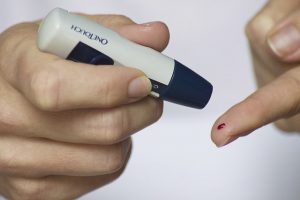Can Back Pain Be Related to Diabetes?
Back pain can be caused by numerous things: an injury, congenital condition or simply from aging. In addition, recent studies are looking to see if back pain can be related to diabetes!
What is Diabetes?
Diabetes is a condition in which the levels of glucose in your blood are too high.
 Glucose is a sugar that your body takes from food and uses to provide energy for your cells. Insulin, a hormone created in your pancreas, aids the process of converting food to energy.
Glucose is a sugar that your body takes from food and uses to provide energy for your cells. Insulin, a hormone created in your pancreas, aids the process of converting food to energy.
When a person has diabetes they either don’t produce enough insulin or don’t use insulin effectively. The result is a high level of glucose in the blood.
There are different types of diabetes as well as different severities. While there is no cure for the condition there are ways individuals with diabetes can help manage and maintain therapeutic blood sugar levels.
High levels of blood sugar is known to lead to many health problems including: heart disease, nerve problems, foot problems, eyesight issues, stroke and more. Can diabetes also lead to neck and/or back pain? That’s what some researchers are trying to find out.
Diabetes and Back Pain – Are they Related?
In 2017, a study of adult twins was conducted to see if there was a link between type 2 diabetes and back pain. Their study showed that people with type 2 diabetes were more likely to experience chronic back and neck pain. However, when the researchers took into account other factors such as age, sex, BMI (body mass index) and level of physical activity, the correlation became insignificant. In other words, the researchers could not prove a cause and effect relationship between diabetes and chronic spine pain. However, they did note that those with type II diabetes are more likely to suffer from chronic back and neck pain.
In 2018 a study of over 22,000 individuals was conducted in Spain. This study again it showed that individuals with diabetes were more prone to chronic back pain and chronic neck pain. Women with a high BMI and low levels of exercise were particularly prone to experiencing chronic back pain. In addition, they noted that individuals with neck pain were much more likely to also experience lower back pain and vice versa.
In February 2019, a new research paper was released about the topic. In this study, the researchers attempted to combine all previous documented studies to see if they could determine if there was indeed a relationship between diabetes and chronic back or neck pain. While they could not identify a cause-and-effect relationship between the two conditions, they noted that individuals with diabetes were more likely to report problems with lower back pain and neck pain.
Why Might Diabetes and Neck / Back Pain Be Related?
As you can see, the full relationship between diabetes and problems of the spine is not understood. However, many researchers have identified potential causes for why the two conditions may be linked.
Some of the potential reasons for correlation between diabetes and spine pain could be:
- There is frequently a correlation between body mass index (BMI) and diabetes. Individuals with a higher body mass index would also be prone to spine issues because of the additional pressure and stresses on the spine.
- Individuals with diabetes or individuals with a higher BMI may also exercise less. Without strengthening your core muscles, the spine is relied upon to support more of your body’s weight. These additional pressures could lead to pain.
- Diabetes also impacts the respiratory system. Individuals with diabetes have decreased lung function and are more prone to respiratory ailments such as asthma and COPD. Reduced respiratory function would lead to lower levels of oxygen being supplied to tissues. Those tissues include the tissues of each inter-vertebral disc. These discs could become brittle and fail to perform their function of acting as “shock absorbers” for the spine.
References
